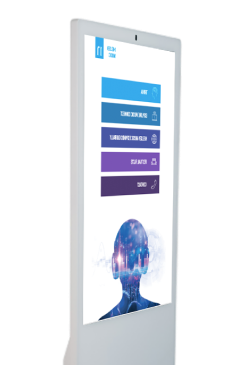

Event Solutions

Our Work

The Advantages OF A DIGITAL DIRECTORY BOARD
Even if there are still some old, analog building directories, most companies of all sizes and in all sectors have switched to digital alternatives. It's simple to understand why DIGITAL DIRECTORIES have grown to be so well-liked over the past five years given their wide range of applications, appealing design, and affordable pricing.
A digital directory board: what is it?
Visitors, staff members, clients, and visitors can easily find particular areas of a building or campus with the use of digital directory boards. This can apply to a variety of places, such as shops in malls, establishments in commercial office buildings, airport terminals and gates, conference rooms, or the offices of various people, such as team members or employees.
What varieties of digital directories are there?
Digital directories come in a variety of designs, some more intricate than others.
Non-Touch Static: These digital directories display the same information at all times. They are frequently found in office building lobbies, where they display a list of offices, typically organized by company name, along with information about their location, such as floor and suite number.
Non-Touch Dynamic: Although these digital directories are not touch-enabled, they can display more data by cycling through a predetermined number of pre-programmed screens. Screens can be added to display weather, traffic, and news in addition to the normal directory information that they most frequently display.
Touchscreen and Interactive: Touchscreen and interactive digital directories are the most expensive but also the most useful. Additionally, they provide more opportunities for profiting from the bigger investment through means like sponsored local advertising.
Which Companies Are Benefits of Digital Directory Boards?
Digital directories are present in a wide range of settings. Airports and other transit hubs, medical facilities, shopping malls, courthouses and justice centers, business buildings, and college campuses are a few of the locations where they can be seen more frequently.
Office buildings: Depending on the size of the building, digital office building directories may occasionally be found on each floor and are typically found in the lobby.
Healthcare: Digital directories might be useful for large hospital campuses to let patients feel more at ease and less concerned about navigating a new location.
Schools: Some of the first places to employ computerized directories were university campuses. It is simple to understand why they would be required given that they are some of the only locations nearby that consistently "turn over" 14 or more of their population.
Justice centers and judicial complexes: In bigger towns and county seats, judicial complexes can be huge and difficult to find. Additionally, the vast majority of visitors are probably experiencing the campus for the first (and hopefully final!) time, so they probably won't have enough time to acquire accustomed to their surroundings.
Hubs for transportation: Travelers may need to locate a number of different sites in airports. Gates are only one part of it; there are also restrooms, lost luggage, baggage claims, airline support, eateries, and shops.
Advantages of Digital Interactive Directory Boards
Digital directories with touchscreen interactive capabilities may cost more, but they may be well worth the extra cost due to the variety of advantages they offer. A few of these are:
Messaging that is customizable can be updated frequently to remain pertinent and helpful to its target audience. Digital directories can be used to share information about events and meetings, even when they change regularly from day to day, in places like hotels or conference centers, for instance.
Interactive digital directories are much more beautiful and modern than their analog counterparts, which results in greater and more user engagement. They are an easy approach to renovate and enhance a variety of areas, particularly the lobbies of office buildings.
Digital directories can be easily updated remotely and have fresh content automatically pushed out on a regular basis because they are computerized. Especially in cases where spaces are shared and users change regularly, colleges and universities frequently employ this feature to assist students and staff in locating classrooms and lecture halls.
Popshap: Why Use Us for Digital Directories
Popshap offers kiosks manufactured for a variety of digital directory designs ideal for every location, whether for hospitality, healthcare, educational, or office administration applications. Our directory software can be tailored in countless ways to match the demands of our clients, from basic digital personnel listings to interactive maps, weather, stock prices, digital advertising, and local area information. Want to know more? Call our sales team at 1.888.317.5531 or REQUEST AN ONLINE QUOTE to get in touch with Popshap right away.